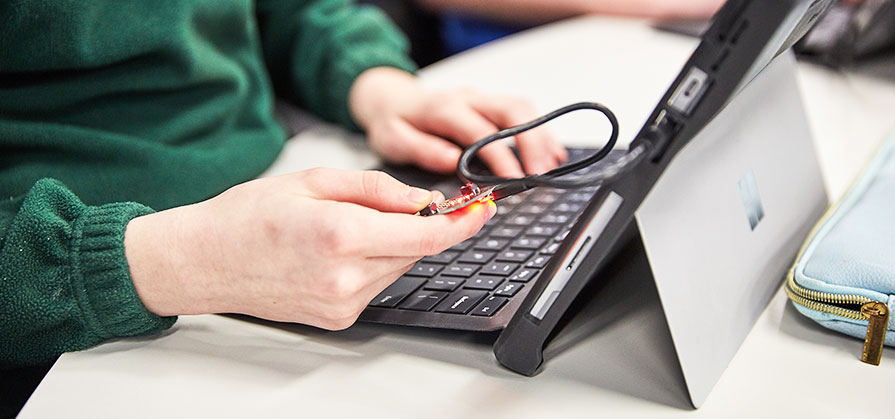CCGS is a technology rich learning environment committed to high levels of digital literacy. Our teaching practice evolves to reflect the changing world around us. Technology has played a significant part in making knowledge far more accessible and when used correctly it can make learning a more immersive, relevant and compelling experience.
We make sure technology is used meaningfully and safely to improve learning and reflect real world practice. That’s why we’re committed to developing a high level of digital literacy, with staff and students as active learners and users, developing the essential digital literacy skills required in a more connected and globalised workforce.
You might be wondering if schools are teaching enough digital literacy or maybe you’re thinking there’s too much screen time at school.
Today’s digital literacy journey is so much more than iPads and computers. It's about using available technology to change the way you think, add value to your conversations and enhance your learning.

Teachers learn digital literacy too
CCGS teachers introduce digital technology to enhance student learning. All teachers have completed digital literacy workshops, led by our Director of Innovative Learning and Digital Literacy.
Teachers are trained in the selection and use of relevant technology to create lesson sequences. They receive in-class ongoing support to deliver and evaluate their new lessons. Ideas are shared across teams, growing expertise school-wide and feeding into continuing digital literacy professional development.
Cyber awareness
As an accredited eSmart school, we’re committed to empowering students with the skills to make smart, safe and responsible decisions online. eSmart is a world leading framework that uses best practice tools to educate, track and minimise the risk of cyberbullying.
Teaching children to be safe and savvy online begins in Year 2 with age appropriate content in eight areas:
- Internet safety
- Privacy and security
- Relationships and communication
- Digital footprint and reputation
- Cyberbullying
- Information literacy
- Self-image and identity
- Creative credit
Curriculum and extra-curricular activities
Information and Software Technology is an elective in Years 9 and 10 and Information Processes and Technology and Software Design and Development are HSC course choices.
Robotics is a popular cocurricular activity and CCGS teams have won a number of titles over the years including the opportunity to travel to Thailand and Japan.
Skills and capabilities
All students experience our digital literacy program which is integrated in the curriculum K to 12 and covers skills (can I use it, what can I do) and capabilities (can I apply it intelligently, how can I use this).
Skills
- General skills
- Graphics and multimedia
- Internet and email
- Programming
- Spreadsheets and databases
- Word processing and desktop publishing
Capabilities
- Social and ethic processes
- Investigating
- Creating
- Communicating
- Managing and operating
Typing Club
In Years 1 to 6 students join our Typing Club program to help develop age appropriate typing skills.
What devices do students use at school?
- Kindergarten to Year 2 are provided with one to one iPads increasing their responsibility for use of a personal device.
- Year 3 is provided with one to one Windows Tablets.
- Years 4 to 9 have one-to-one notebook computers for school and home use, deployed and maintained by CCGS. Parents contribute a notebook computer levy for this service that includes immediate onsite technical support and next business day loan devices for any hardware failure.
- Years 10 to 12 are responsible for maintaining and bringing their own device to school and for their choice of software and apps, a great preparation for study post school.
- There are also a number of whole class computer labs around our wireless campus.
- There is a digital technology bridging course available online for new students.
Infrastructure
Digital technologies are integrated in all areas of teaching and learning and these are a few examples of the infrastructure that supports this:
- A sophisticated learning management system enables easy collaboration and remote access to learning resources for students and teachers.
- The senior classrooms incorporate digital collaboration zones and a film studio. Science labs are equipped with digital probes, Technology labs with a laser cutter and printer, Art rooms with iPads to make artworks and music rooms with iPads to mix music.
- Professional recording studio in the Performing Arts Centre.
- Online streaming of educational video resources and professional tutorials when off site.
- Every corner of campus has fast and efficient wireless network.
- Interactive, wireless Vivi projectors in every classroom.
- Firewalls, filters and regular audits of activity to protect students from unauthorised content.

